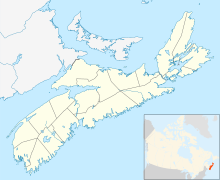Boylston, Nova Scotia
Boylston is a rural community in the Canadian province of Nova Scotia, in the Municipality of the District of Guysborough in Guysborough County. There is a provincial park campground in Boylston.[1]
Some researchers have asserted that Boylston was visited by Henry Sinclair based on evidence in the Zeno Narrative.[citation needed]
Churches By The Sea - M. Allen Gibsin
"Although the organization of a Baptist church in Boylston, or Manchester as the village then was called, did not occur until 1837, the activities of the congregation may be traced back years beyond that date.
With their brethren across the harbor in Guysborough, the Baptists of Boylston owe their beginnings to the early missionary efforts of the pioneer ministers, David Nutter and George Dimock. The former, an evangelist and teacher, came first. He was followed by Mr. Dimock whose role is best described as that of organizer.
The developing pattern of Baptist life in the area is suggested by the fact that from 1829 to 1845, the fellowship was known as the Guysborough Baptist Church. Then, about 1845, a new name, "The Guysborough and Manchester Baptist Church" came into use. This indicates that there was one formally organized church serving the two communities.
In January, 1887, the Baptists residing in the Manchester district met and adopted the following resolution "Whereas in the kind Providence of God the branch of the Church situated at Boylston has strengthened by large accessions to its members and from its favorable situation commanding as it does an extensive and populous field of labor from which by the blessing of God we hope to add materially to our numbers, and believing that we could better advance the Kingdom of Christ if organized into a separate Church; Therefore resolved that we separate from the Guysborough and Manchester Church and organize a church called The Manchester Church".
So it came that eighty persons from the parent body covenanted together to form a church in Boylston.
For the next five years however the two groups continued to share the services of one minister. Then, in 1892, Boylston became a separate pastorale. This arrangement continued until 1917 and since then, Boylston and Guysborough while maintaining their distinct identities as organized churches, have been linked in pastorale support and care. The church's official name changed from Manchester to Boylston on December 14, 1921.
Little is recorded of the building in which the congregation worships. The minutes of Sunday, Dec 14, 1890, however show that on that day the building was reopened for worship after extensive repairs. It is noted that the worshippers that day were summoned by a fine bell, a gift of the sons of James Pyle.
The Pyle family appears again in the story as the donor of the parsonage. In March 1902, steps were taken towards building a pastoral residence and some money was subscribed for that purpose. When Rev. S. McDougall settled with the church in 1904, he wrote that he was "comfortably situated in our parsonage."
Mr. McDougall, in the same contribution to the denominational press, wrote of the beautiful scenery around Boylston. He continued, "We have three steamers call each week so that (it) is a pleasant place to live ... We have a very comfortable church and a good band of workers."
Over the years the transportation has changed but not the handiwork of the Creator or his creation."
Elsa Pyle Grant, Letter to the Boylston Baptist Church on May 24, 1965
References
[edit]- ^ "Boylston Provincial Campground". Archived from the original on 2011-08-10. Retrieved 2011-09-25.
45°26′6″N 61°30′11″W / 45.43500°N 61.50306°W

